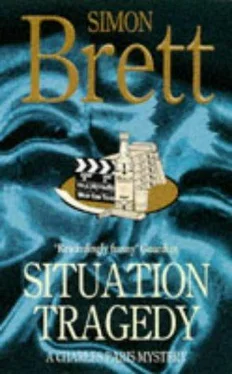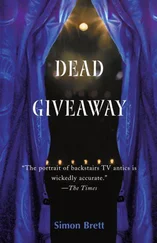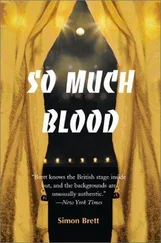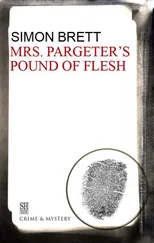Simon Brett - Situation Tragedy
Здесь есть возможность читать онлайн «Simon Brett - Situation Tragedy» весь текст электронной книги совершенно бесплатно (целиком полную версию без сокращений). В некоторых случаях можно слушать аудио, скачать через торрент в формате fb2 и присутствует краткое содержание. Жанр: Классический детектив, на английском языке. Описание произведения, (предисловие) а так же отзывы посетителей доступны на портале библиотеки ЛибКат.
- Название:Situation Tragedy
- Автор:
- Жанр:
- Год:неизвестен
- ISBN:нет данных
- Рейтинг книги:3 / 5. Голосов: 1
-
Избранное:Добавить в избранное
- Отзывы:
-
Ваша оценка:
- 60
- 1
- 2
- 3
- 4
- 5
Situation Tragedy: краткое содержание, описание и аннотация
Предлагаем к чтению аннотацию, описание, краткое содержание или предисловие (зависит от того, что написал сам автор книги «Situation Tragedy»). Если вы не нашли необходимую информацию о книге — напишите в комментариях, мы постараемся отыскать её.
Situation Tragedy — читать онлайн бесплатно полную книгу (весь текст) целиком
Ниже представлен текст книги, разбитый по страницам. Система сохранения места последней прочитанной страницы, позволяет с удобством читать онлайн бесплатно книгу «Situation Tragedy», без необходимости каждый раз заново искать на чём Вы остановились. Поставьте закладку, и сможете в любой момент перейти на страницу, на которой закончили чтение.
Интервал:
Закладка:
‘Oh, lovely, darling. I’ll write that one down.’
While her husband committed the gem to paper, Sam Tennison continued, ‘Willy always uses a blue notebook, while I like pink ones. We never go anywhere without our notebooks, do we, darling?’
‘Never, darling. Never know when the Muse will strike.’
‘As one pussy cat shop steward said to the other.’
‘Oh, darling, that’s another one for the book.’
Charles prayed for the return of Bob Tomlinson. He also mentally fabricated a new series which would chronicle the remainder of Willy and Sam Tennison’s lives if he had his way. There’d be Mum’s The Word! for when their tongues were cut out, There’s a Funny Thong! for when they were garrotted, and, to cover their funerals, We’re Only Here for the Bier!
Eventually, Bob Tomlinson and belligerent sanity returned.
‘Hello, Bob, I’m Sam. .’
‘And I’m Willy. .’
‘Shut up.’
‘We’re your new writers.’
‘Are you? Well, I don’t want you round my rehearsal rooms. Send your scripts in by post. You’ve already wasted enough time this morning. We’ve got a tight schedule. We’re losing two days’ rehearsal with the filming we’ve got to pick up. Incidentally, everyone, the overnight shoot for Ep. Six is fixed for Thursday fortnight. 5th July. Okay, read!’
‘But, Sam and I had hoped — ’
‘But, Willy and I had hoped — ’
‘Didn’t you hear me? Piss off.’
He was a good man, that Bob Tomlinson, thought Charle.
The overnight filming Bob had mentioned was for an insert into the last Strutters script Rod Tisdale wrote. In fact, it was the last full script of any sort that he wrote, but anyone who searched through its fabric for some final message from the writer to the world would have been disappointed. All he would have found was a predictable plot, dressed up with sixty-seven familiar jokes, fifty-two of which were destined to receive laughs from the studio audience and the remaining fifteen to have artificial ones imposed in the dubbing suite. Not a great memorial to a human being (which is what Rod Tisdale must have been, though he never gave any sign of it).
Charles had found out as much as he could about the writer’s death, but there was not a lot. His relaxed rehearsal schedule (given a pragmatist like Bob Tomlinson as director, fourteen lines and two moves didn’t take long to perfect) allowed him time to go to the inquest, but information seemed to be scarce.
Rod Tisdale had lived in a block of flats in a quiet road in Maida Vale. At nine o’clock on the previous Friday evening, 15th June, he had left the block and started out across the road, where he had been knocked over and killed by a vehicle travelling at considerable speed.
There had been no witnesses of the accident, though people in other flats had heard the impact. By the time they looked out of their windows, only parked cars were visible.
Rod Tisdale had lived alone, and had apparently spent the day in his flat working. Investigations so far suggested that he had not spoken to anyone on the telephone except for his agent, and had not then mentioned any plans to go out. There was nothing in his diary to indicate why he set out at nine o’clock. He might have been walking towards Maida Vale tube station. He might have been going to the local pub (though he was very rarely seen in there). He might just have been going out for a walk.
Police investigations would continue to try to track down the errant vehicle which had killed him, so an adjournment was requested. The coroner granted it in a voice that did not expect much more to be discovered and commented on the alarming increase in hit and run accidents.
There was no one Charles Paris recognised at the inquest, so he left little the wiser. The death could just have been an accident. On the other hand, if the potential murderer were someone Rod Tisdale knew, the murder would have been fairly easy to set up. He had only to ring the writer, fix a meeting-place which would involve his crossing the road, and sit and wait for him to come out.
So, just another death, and apparently an accidental one. Every attempt at a pattern Charles started was soon frustrated. He had been on very promising lines with Bernard Walton cast as villain, but that approach had been mined by the latest incident. Rod Tisdale’s death would do nothing to halt the progress of The Strutters, and was, on the contrary, a positive loss to Bernard, who had looked to the writer to come up with a new star vehicle for him.
So, even if Bernard Walton hadn’t got the one alibi Charles could never crack, his motivation was gone, and, with it, fantasies of the star bringing in hired killers to do his dirty deeds.
Charles tried to contact Bernard a few days later with a view to checking a few facts about Scott Newton’s death, but the housekeeper said Mr Walton had gone for a month’s holiday to his villa in Sardinia. Since this was supported the next day by a photograph of the star beaming farewells at Heathrow Airport, there was no reason to disbelieve it. (Charles’s first cynical reaction to the news had been that Bernard’s Publicity Manager had packed him off to Sardinia in the hope that a well timed kidnap might bring his client back to public attention.)
So, if any further accidents hit The Strutters team during the next month, it was pretty unlikely that Bernard Walton had anything to do with them.
But for the next couple of weeks there was no sign of any sort of accident. Charles began to think that the first three must after all be just unfortunate coincidences.
All that happened was that The Strutters continued to be made, and that was quite a tiring process for all concerned. The basic pattern for the first burst of the series had been for Tuesday evening recordings, with a read-through for the next episode the following morning. Six weeks of this was already a heavy schedule, but the need to fit in extra filming days to replace those lost after Scott’s death made it very heavy indeed. Saturday rehearsals crept in, then Sunday ones. Even Charles, on whom the demands of fourteen lines and two moves a week were not onerous, began to get tired. The strain on the principals must have been enormous.
George Birkitt reacted by occasional bouts of temperament. He was not used to learning so many lines every week and was often still to be seen with script in hand at the Dress Run on recording day. He got very cross when the poor little Assistant Stage Manager charged with the task prompted him, and kept complaining that he found the lines difficult to remember because they were so badly written.
Aurelia Howarth, on the other hand, always knew her lines after a couple of days and generally showed professionalism and stamina which would have been remarkable in an actress half her age. She still appeared very anxious, no doubt worried about Cocky’s health, but did not let this interfere with her work. She lived up to the theatrical standard of a ‘trouper’ and, by contrast, showed up George Birkitt’s relative immaturity.
In spite of her worn looks, she did not seem to have lost any of her enthusiasm for the business. Indeed, a couple of days after Rod Tisdale’s death, Charles was amused to hear her asking Peter Lipscombe whether he’d yet read the books she’d lent him. She was sure there was series potential there.
Peter apologised, promised they were next on his list, really. Charles had heard that from too many producers to take it too seriously. Though many television producers can read scripts, it’s a very rare one who can manage a whole book.
So there didn’t seem much prospect for Aurelia’s idea. But Charles was impressed that at her age and in the middle of such a tight schedule she was still on the look-out for a new project.
Читать дальшеИнтервал:
Закладка:
Похожие книги на «Situation Tragedy»
Представляем Вашему вниманию похожие книги на «Situation Tragedy» списком для выбора. Мы отобрали схожую по названию и смыслу литературу в надежде предоставить читателям больше вариантов отыскать новые, интересные, ещё непрочитанные произведения.
Обсуждение, отзывы о книге «Situation Tragedy» и просто собственные мнения читателей. Оставьте ваши комментарии, напишите, что Вы думаете о произведении, его смысле или главных героях. Укажите что конкретно понравилось, а что нет, и почему Вы так считаете.












